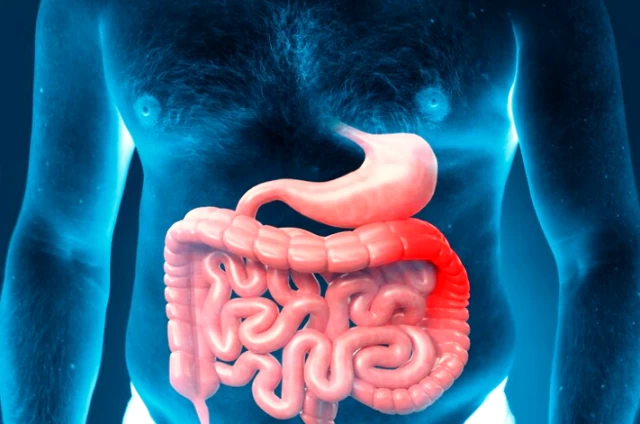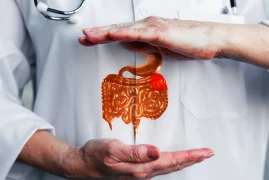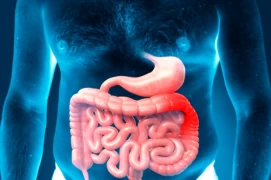
Colon Cancer - Part 1: Incidence, Symptoms, Risk Factors
- Colon Cancer - Part 1: Incidence, Symptoms, Risk Factors
- What is Colon Cancer?
- Incidence of Colon Cancer Worldwide and in Our Country
- What are the Symptoms of Colon Cancer?
- What are the Risk Factors for Colon Cancer?
Colon cancer is a type of cancer that occurs in the large intestine or rectum. General surgical specialists provide comprehensive expertise in the diagnosis, treatment, and monitoring of colon cancer. In this first part of a four-part article where we will provide an extensive overview of colon cancer, we will discuss the definition of the disease, its incidence, symptoms, and risk factors.
What is Colon Cancer?
Colon cancer is typically a cancer type that arises in a region of the digestive system called the large intestine or colon. The colon, located between the small intestine and the anus, plays a crucial role in the absorption of water and salts during the digestive process. Colon cancer usually begins with the transformation of small, benign tumors called polyps into cancer over time.
In the early stages, it often shows no symptoms, making early diagnosis challenging. However, as the disease progresses, symptoms may manifest.
Colon cancer is usually diagnosed through imaging techniques such as colonoscopy, biopsies, and other medical tests. When detected in the early stages, colon cancer can be more effectively treated.
Incidence of Colon Cancer Worldwide and in Our Country
Colon cancer is a significant health issue globally and in Turkey. Cancer statistics can change over time and may vary due to various factors.
- Worldwide Colon Cancer: According to World Health Organization (WHO) data, colon cancer is one of the most common cancer types globally. It affects millions of people annually and can lead to fatalities. Particularly in developed countries, the incidence of colon cancer has increased along with changes in lifestyle factors.
- Colon Cancer in Turkey: In Turkey, colon cancer is a substantial health problem, and its incidence is on the rise. Studies conducted by the Turkish Statistical Institute (TÜİK) and the Ministry of Health indicate that colon cancer has a high frequency among cancer cases in our country. The frequency of this cancer type may be higher, especially in major cities and western regions.

What are the Symptoms of Colon Cancer?
Symptoms of colon cancer may not be evident in the early stages. However, as the disease progresses, symptoms may emerge. Common symptoms of colon cancer include:
- Changes in Bowel Habits: Noticeable changes in bowel habits such as constipation or diarrhea
- Abdominal Pain and Cramps: Continuous or intermittent pain and cramps in the abdominal region
- Bloody Stools: Presence of blood in the stool or dark-colored stools
- Loss of Appetite and Weight Loss: Appetite and weight loss, especially due to digestive issues
- Fatigue and Weakness: Fatigue and weakness caused by anemia (low red blood cell count)
- Gas and Bloating: Persistent gas accumulation and a feeling of bloating in the abdomen
- Thinning and Weakness: General weakness, loss of energy, and reduced stamina
- Tenesmus: The feeling of the urge to urinate or defecate, but the processes do not occur
- Symptoms of Bowel Obstruction: Nausea, vomiting, and abdominal swelling in advanced stages due to bowel obstruction.
- General Health Issues: Symptoms in relevant organs such as the liver, lungs, or other organs in the case of metastasis in advanced stages.
- Age: The risk of colon cancer increases with age, becoming more significant after the age of 50.
What are the Risk Factors for Colon Cancer?
- Family History and Genetic Factors: A family history of colon cancer, especially in first-degree relatives (parents, siblings, children), can elevate an individual's risk. Genetic syndromes, such as Lynch syndrome or familial adenomatous polyposis (FAP), can increase the risk of colon cancer.
- Personal History: Individuals who have had colon, rectum, or certain other cancer types before are at a higher risk of developing colon cancer again.
- Inflammatory Bowel Diseases: Chronic inflammatory bowel diseases, especially ulcerative colitis and Crohn's disease, can increase the risk of colon cancer.
- Polyps: Intestinal polyps, such as adenomatous polyps, can transform into cancer over time, thereby increasing the risk of colon cancer.
- Dietary Habits: High-fat, low-fiber diets, particularly excessive consumption of red meat and processed meats, can increase the risk of colon cancer. Low intake of vitamins and minerals can also impact the risk.
- Level of Physical Activity: Low levels of physical activity can lead to obesity, which, in turn, increases the risk of colon cancer.
- Smoking: Smoking can elevate the risk of colon cancer.
- Alcohol Consumption: Excessive alcohol consumption can increase the risk of colon cancer.
- Type 2 Diabetes: Individuals with a history of type 2 diabetes may have an increased risk of colon cancer.
- Radiation Exposure: Prolonged exposure, especially to the pelvic region, can increase the risk of colon cancer.
These risk factors should be individually assessed, and having multiple risk factors can further increase the overall risk of colon cancer.
In the second part of the Colon Cancer series, I will focus on the diagnosis and treatment methods of Colon Cancer.

Op. Dr. Kadir Dicle
General Surgery Specialist





